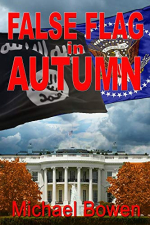Author R&R with Michael Bowen
 Michael Bowen recently retired from a 39-year career as a trial lawyer. The author of nineteen published novels, as well as scholarly and political commentary, Bowen is a graduate of Harvard Law School, where he served on the Harvard Law Review. Bowen and his wife Sara, a noted lecturer on Jane Austen and Harvard Law graduate, live in Fox Point, Wisconsin.
Michael Bowen recently retired from a 39-year career as a trial lawyer. The author of nineteen published novels, as well as scholarly and political commentary, Bowen is a graduate of Harvard Law School, where he served on the Harvard Law Review. Bowen and his wife Sara, a noted lecturer on Jane Austen and Harvard Law graduate, live in Fox Point, Wisconsin.
 Bowen's new crime novel, False Flag in Autumn, a seemingly ripped-from-the-headlines political thriller featuring protagonist Josie Kendall, introduced in 2016’s Damage Control, which Kirkus called "Bowen’s ebullient antidote to election year blues."
Bowen's new crime novel, False Flag in Autumn, a seemingly ripped-from-the-headlines political thriller featuring protagonist Josie Kendall, introduced in 2016’s Damage Control, which Kirkus called "Bowen’s ebullient antidote to election year blues."
In False Flag, a rogue White House aide tries to use lobbyist Kendall as an unwitting pawn in a plot for a spectacular October surprise before the 2018 mid-term elections. She calls on her D.C.-insider husband, her edgy uncle, and colorful denizens of the Louisiana demi-monde to help her out-hustle the hustlers. But then Josie finds herself facing an even more daunting question: is there a false-flag attack planned in order to influence the 2020 presidential election? Josie will be forced to decide whether to venture out of the Beltway cocoon—where the weapons are leaks, winks, nudges, and spin—into a darker world where the weapons are actual weapons.
Bowen stops by In Reference to Murder today to take some Author R&R:
THE JOYS AND PERILS OF RESEARCH IN WRITING MYSTERY FICTION
By Michael Bowen
I’ll never forget the picture: four-color two-page spread in Ladies’ Home Journal back in 1962, when that magazine had roughly the dimensions of a coffee table instead of the more standard size on newsstands today. It featured a standing rib roast fresh out of the oven, with a layer of perfectly browned fat at least two inches high. This was the centerpiece of an ad for something or other, but all I remember is the roast and the salivation it induced.
Cholesterol? Never heard of it. Ignorance was bliss.
I came across that ad serendipitously in the early 1990’s, doing research for a mystery set in New York City a generation earlier. My editor quite reasonably wanted to know whether household products that I had sprinkled into the story as background were actually on the market in 1962. Google didn’t exist yet – I just Googled it and verified that it wasn’t created until 1998 – so the best way to find out was to traipse to a public library and look at back issues of magazines aimed at housewives.
Bingo. You could indeed buy Johnson’s Wax and Pledge in the second year of the Kennedy administration. The New Yorker also accepted cigarette advertisements back then, including one for Parliaments with recessed filters – “NEAT AND CLEAN!” – apparently aimed at charming young women who enjoyed smoking but had a paradoxical aversion to actual tobacco. I stumbled over that one while trying to find out what Broadway shows my characters might have attended. An ad with that many layers of irony was too good to pass up. I actually plugged it into the story, along with The Fantastics and A Funny Thing Happened on the Way to the Forum. Don’t tell anybody, but research is fun.
It’s also important. The first chapter of a courtroom drama I was reading a few years ago featured a fiercely whispered debate at counsel table between the two lawyers for the defendant in a murder case about whether to cross-examine the arresting officer, whose testimony on direct had just concluded. Boys and girls, this is something you think about before the first day of trial. I never got to chapter 2. Same with a scene in a fairly recent big-business-is-bad mystery in which a male senior executive who is a complete jerk capriciously and impulsively fires a female newbie who is a charming sweetheart. For at least a generation you’ve needed a sign-off from Human Resources and probably from a departmental committee and the company’s general counsel before you could even think about firing a member of a protected class in a firm with more than six employees
As far back as the 1930’s Dashiell Hammett was railing against lazy crime writers who didn’t know the difference between revolvers and automatic pistols. (The former don’t have safeties and don’t eject shell casings; the latter do). Midshipmen at the Naval Academy will not find themselves anywhere near the deck of an aircraft carrier during plebe summer, contrary to a late ’ninties movie about a female plebe who had allegedly murdered a romantic rival before reaching Annapolis. And so forth.
For quite awhile now, of course, we’ve been able to get information about basically anything with a few mouse clicks, without having to pore through stacks of periodicals in libraries. The catch is that you have to know what you don’t know. I knew that I didn’t know how fast males in good condition could be expected to move across uneven ground on foot in the dark, so when I was writing False Flag in Autumn this year I asked a graduate of West Point. On the other hand, it never occurred to me that the eponymous patron of a Boston art gallery victimized by a huge theft in the 1990’s, which I invoked in But Remember Their Names, might have spelled her last name differently than most people named Gardner spelled theirs. After correcting the spelling to Gardiner, my editor pointed out scoldingly that I could easily have looked this information up myself. Of course I could have – and I would have if I’d had the slightest doubt about the accuracy of my flatly erroneous assumption.
The larger problem with research is that it’s so much fun that the tail can end up wagging the dog. If you’ve invested three hours in confirming that colleges at Oxford University permitted women students to smoke on campus in 1912 (they did, to the delighted surprise of Dorothy L. Sayers), you’ll be strongly tempted to plug that datum into your story even if it doesn’t add enough to plot, characterization, or setting to justify the sentence or two – or three, or four – required to do so. If you’ve tracked down eight plays showing on Broadway in 1962, all you need for background color is to have a character casually mention going to one of them – but why not “show your work” by shoehorning the entire laundry list into your story? (Oops, I did that in Fielder’s Choice, didn’t I? Hey, I was young.)
Maybe the moral here is that writers should build their research on a foundation of humility. It helps to remember that, no matter how much we’ve learned from diligent inquiry among diverse sources about emergency room protocols, the muzzle velocities of civilian-model assault rifles, the Federal Rules of Evidence, or the names of streets in downtown Chicago, there will be readers who know more than we do – and some of them will let us know if our diligence leads us to incautious extrapolation from what we’ve learned. Much worse, others will simply stop reading.
The Whig historian Hilaire Belloc wrote that it isn’t bad history to say that the Battle of Waterloo was fought on a Tuesday even though it was fought on a Sunday, but it is bad history to say that it was won on the playing fields of Eton. Belloc was a better historian than I am, so I’ll defer to his judgment. What I can affirm with confidence is that it is bad mystery-writing to say either one – especially if you’re writing a plucky-couple puzzle mystery set in contemporary Seattle.
For more information about the author or his books, visit Michael Bowen online.






 Related StoriesAuthor R&R with John DeDakisAuthor R&R with Mark BerginAuthor R&R with Louise Jensen
Related StoriesAuthor R&R with John DeDakisAuthor R&R with Mark BerginAuthor R&R with Louise Jensen
In Reference to Murder
- B.V. Lawson's profile
- 201 followers



